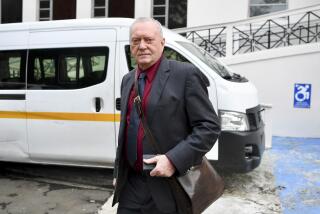Holders of Worthless Bonds Cheer, Say Justice Is Served : Crime: Some believe the conviction will help lawsuits they have pressed against Keating’s attorneys and accountants.
- Share via
The news that Charles H. Keating Jr. was convicted Wednesday of 17 counts of securities fraud on his 68th birthday brought a chorus of cheers from those who liked him least: the bondholders of American Continental, Keating’s former real estate development company.
“He got what he deserved,” said Harold Rosenberg, a Sherman Oaks attorney. “His fraud and connivances brought a lot of hardship for senior citizens who could ill afford it.”
The news was particularly sweet for people such as Los Angeles accountant Norman Lapin, whose elderly parents invested $120,000 in the bonds, which were rendered virtually worthless after American Continental went into bankruptcy in 1989.
“My father has never been the same since,” Lapin said. “He was a Depression kid and he had to live through this.”
Though the bonds are now worthless, the bondholders still stand to get some of their money back if pending lawsuits against Keating’s attorneys and accountants are successful, said Kevin P. Roddy, one of the bondholders’ several attorneys.
The criminal conviction should help the bondholders’ case, Roddy added. “I would think that this decision moves that ball down the field,” he said.
Only a few years ago Keating was one of Arizona’s leading businessman when it came to riches, color and political clout. Phoenix-based American Continental owned Lincoln Savings in Irvine.
Keating was specifically charged with defrauding 19 small investors who were part of the thousands of people who lost in excess of $250 million when the Keating empire collapsed more than 2 1/2 years ago. The 19 investors lost more than $1 million.
Using testimony from 53 witnesses in 35 days of testimony over four months, prosecutors showed that Keating promoted the sale of American Continental bonds at the same time that he knew that the financial health of its primary subsidiary, Lincoln Savings, was in serious trouble.
The collapse of Lincoln Savings in April, 1989, will be remembered as a low-water mark in the history of the nation’s savings and loan scandal, which unraveled gradually throughout the 1980s and is costing American taxpayers dearly in the 1990s.
Not all the bondholders were swept up in the euphoria of Keating’s conviction, however. “He’s going to get off the hook (on appeal),” said one bondholder who asked not to be identified. “He’s a clever fellow.”
But most did not dwell on what would happen. “I’m happy, I’m happy,” said Leah Kane, 70, a Laguna Hills Leisure World resident who lost $15,000 in American Continental bonds. “I want a shot of whiskey right now and I don’t even drink.”
Though she applauded the decision, bondholder Shirley Lampel, 60, of Irvine, noted a tinge of sadness in the news. “Some of the bondholders have already died, destitute,” she said. “They aren’t around to enjoy this day.”
One witness who testified against Keating was Ray Fidel, a former president of Lincoln Savings who pleaded guilty to six counts of fraud. Fidel said that he realized in late 1988 that the bonds were much riskier than advertised, but potential buyers were never advised of the increased dangers.
Another former high-ranking Lincoln executive, Robin S. Symes, who also pleaded guilty to six fraud counts, testified that Keating controlled virtually every phase of Lincoln’s business down to the smallest detail.
More to Read
Inside the business of entertainment
The Wide Shot brings you news, analysis and insights on everything from streaming wars to production — and what it all means for the future.
You may occasionally receive promotional content from the Los Angeles Times.










